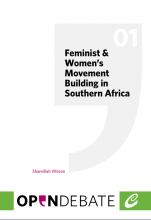Feminist and Women's Movement Building in Southern Africa

The world as we see it today is characterised and defined by power – expressed in political, social and economic terms and manifested in phenomena such as the erosion of democratic spaces, global economic crises and inequalities based on gender, ethnicity, religion, disability, age, sexual orientation and so on. In particular, women continue to be impacted in ways that persistently compromise their dignity and human rights. While there is almost universal recognition of women’s rights, for most women their rights only exist on paper. Statistically, women still make up nearly two-thirds of the world’s illiterate people, comprise two-thirds of the world’s poor (living on US$1 a day or less), perform two-thirds of the world’s work and produce 50 percent of the food, while earning only 10 percent of the income and owning just 1 percent of the property 1 . In addition, violence against women is a worldwide phenomenon of immense proportions. The United Nations Development Fund for Women reports that ‘for women aged 15 to 44 years, violence is a major cause of death and disability’. 2 Moreover, as global economies continue to shift and reconfigure themselves, the rise of various religious and cultural fundamentalisms are posing an additional threat to women’s rights in many places.
